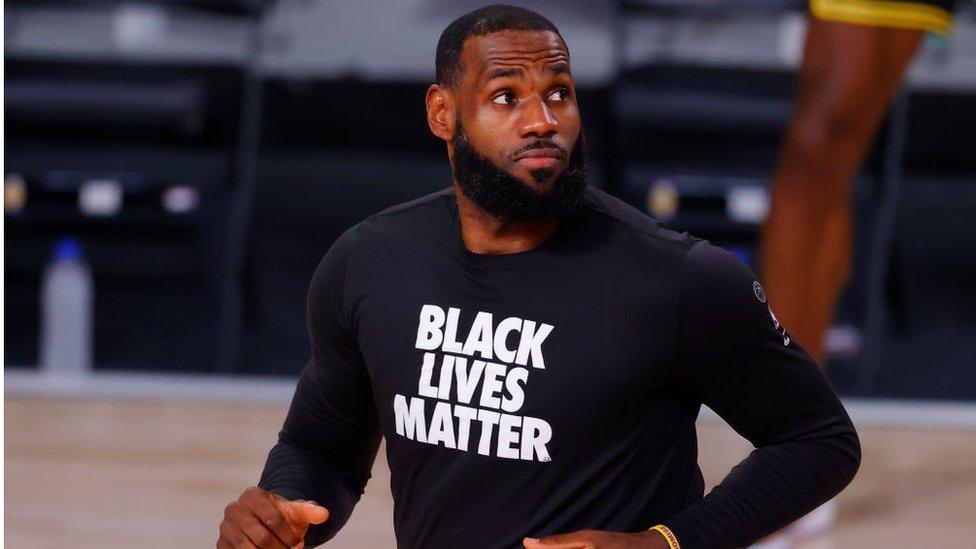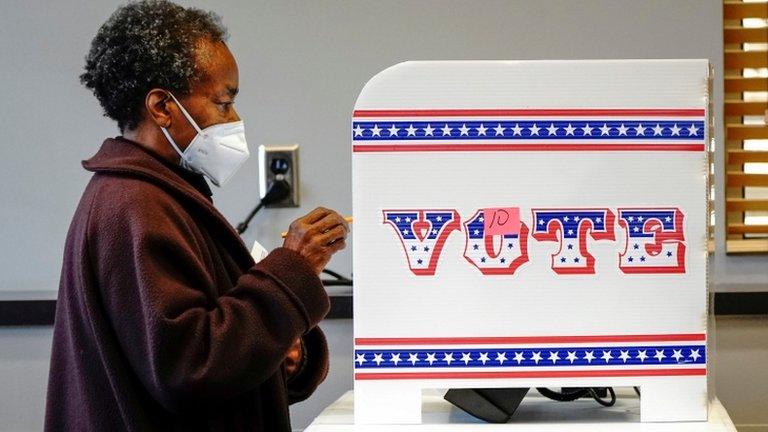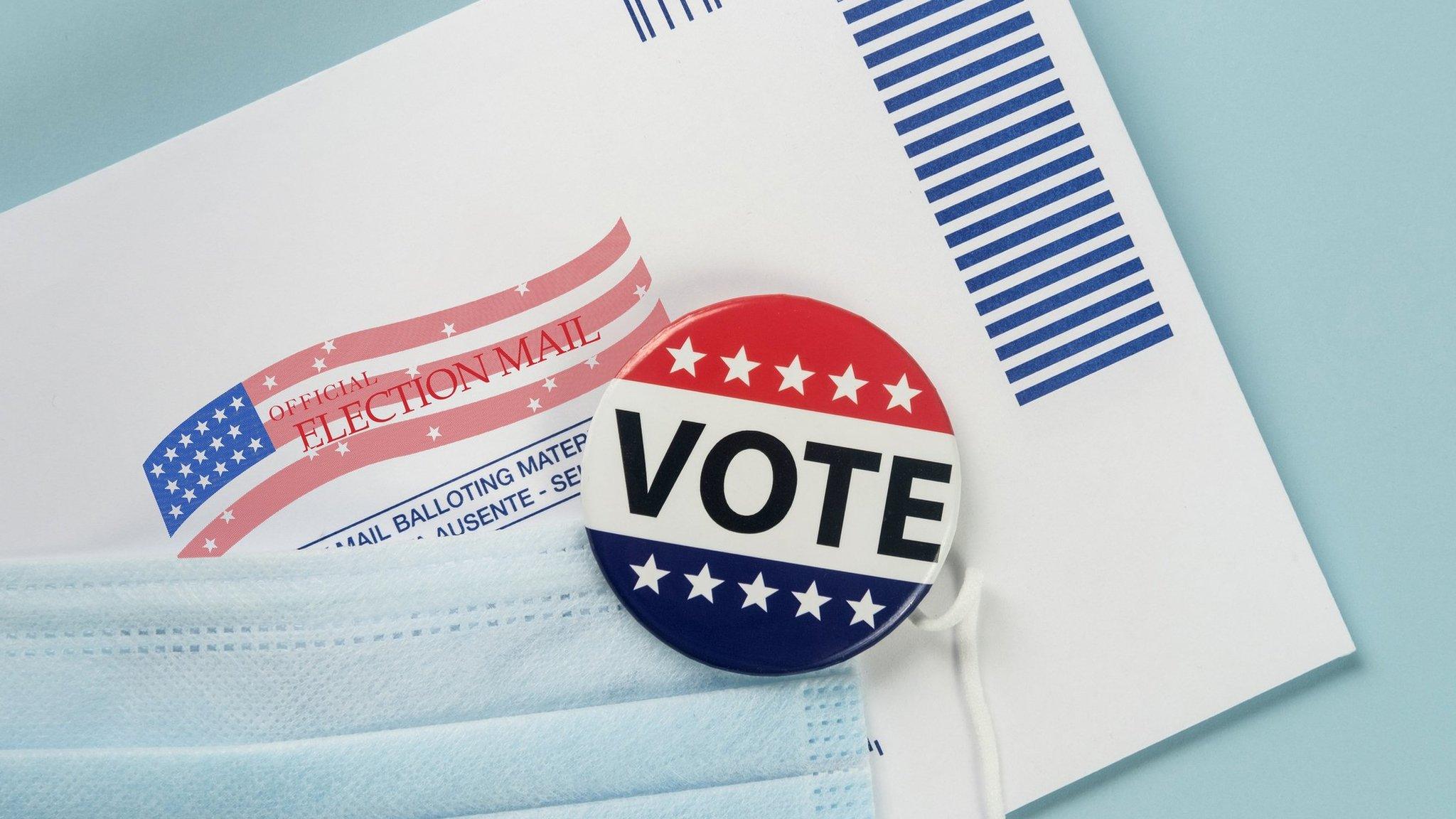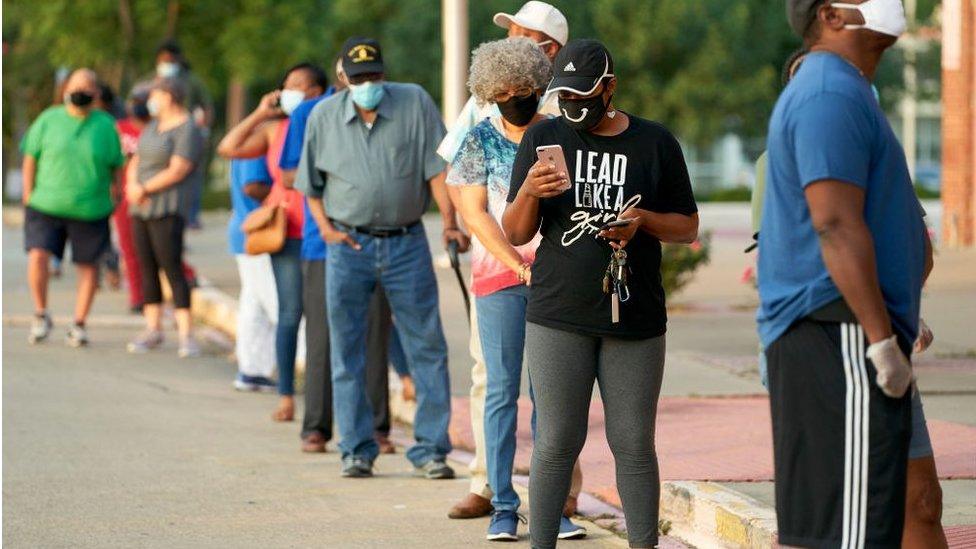Georgia lawmaker arrested as governor signs new election law
- Published
Georgia lawmaker Park Cannon arrested as governor signs voting law
A state lawmaker in Georgia has been arrested and charged amid protests over a new election bill.
Democrat Park Cannon was handcuffed and removed from the state capitol for banging on Governor Brian Kemp's office door as he signed the bill.
Republicans say the new voting laws are "common sense", but Democrats slammed the measures as "sick" and say they will suppress the vote.
Georgia was at the heart of false voter fraud claims during the 2020 election.
Former president Donald Trump, who was the first Republican to lose the state in a presidential election since 1992, repeatedly pressured elected officials in the state to investigate his unsubstantiated claims that the election had been stolen from him.
Then in January, Democrats took control of the US Senate when Georgia Republicans lost two run-off races.
Despite those Democratic wins, the state's government is controlled by the Republicans.
Republicans introduced the Election Integrity Act of 2021, and it hurtled through both chambers of the state's Republican-controlled legislature within the space of a few hours on Thursday.
It makes Georgia the first presidential battleground state and the second overall to pass laws that restrict ballot access in the aftermath of the 2020 election.
"Georgia will take another step toward ensuring our elections are secure, accessible and fair," Governor Kemp told reporters while signing the bill.
Several demonstrators rallied at the state capitol as he signed the new legislation in a closed-door session.
Video shows Ms Cannon knocking on the governor's door in protest and then being handcuffed and escorted out of the building by two Georgia state troopers.
According to her arrest warrant, Ms Cannon "knowingly and intentionally" kept knocking on the door despite repeated warnings, and stomped on her apprehending officer's foot with her heels.
In a statement on Facebook, the lawmaker said she "will not stand by while our voting rights are threatened" and pledged to "continue this fight".
Ms Cannon is among those who have slammed the measures in Georgia as "Jim Crow in new clothes" - a reference to the 19th and 20th century laws that enforced racial segregation in the US South.
Allow X content?
This article contains content provided by X. We ask for your permission before anything is loaded, as they may be using cookies and other technologies. You may want to read X’s cookie policy, external and privacy policy, external before accepting. To view this content choose ‘accept and continue’.

Election reform or voter suppression?
The new election laws have received the backing of national Republican groups, which say they will "secure and strengthen state election systems".
Democrats in the state and on the national scene decry it as a naked abuse of power that aims to limit minority and young voters' access to the ballot.
Here's what the new law does:
It adds new ID requirements for requesting mail-in ballots, replacing the current system which simply requires a signature.
Republicans say this will instil greater confidence in election integrity, but Democrats say it will now be harder for working class people - who may not have an ID - to cast a ballot.
It expands early voting access in most counties.
A previous version of the bill that curbed weekend voting prompted an outcry, with Democrats arguing it targeted the Sunday voting drives held by black churches.
It gives the state legislature greater power over the state election board.
Democrats say the move would allow votes in certain counties to be thrown out, which Mr Trump advocated for after his loss.
It bans the practice of giving food or water to voters in line.
The Republican bill labels it a method of soliciting votes, but several media reports suggest that voters, particularly in majority black parts of the state, have often had to wait in line for hours.
It shortens the period for runoff elections.
It will go from nine weeks to four weeks - shortening the time for early and mail in voting. Democrats say that is in an attempt to suppress votes after an energised voter base in Georgia sent two Democrats to the US Senate this year. Republicans say it will more fairly reflect voters' beliefs at the time of the initial vote.
Are US voters being suppressed in Georgia?
The first fight in a national battle
Georgia is among the first states to pass some form of overhaul to voting rules, with Iowa being the first earlier this month.
But it won't be the last. There are currently 253 similar bills in 43 states, according to the left-leaning Brennan Center for Justice think tank.
That's because, while Democrats currently hold slim majorities in both chambers of the US Congress, Republicans dominate statehouses across the country.
Data from the National Conference of State Legislatures shows Republicans have legislative control in 30 states and unified control - including the governorship - in 23 states, far more than Democrats.
Unified control means that what happened in Georgia - where a law quickly passes both chambers and gets signed by the governor - can easily be replicated.
Voting rights advocates say For the People, a democracy reform bill passed by the US House of Representatives, can stop state-level voter suppression in its tracks.
Further, it remains unclear if the bill can pass through the US Senate.
Related topics
- Published23 October 2020

- Published13 July 2021
- Published5 March 2021

- Published20 October 2020

- Published17 October 2020

- Published29 October 2020

- Published13 October 2020
